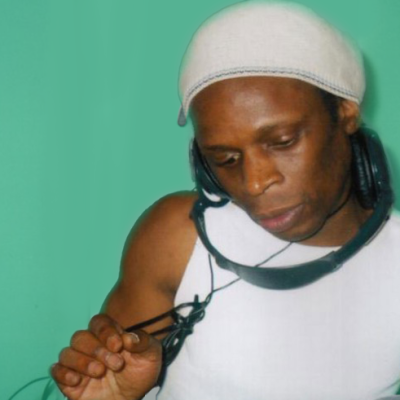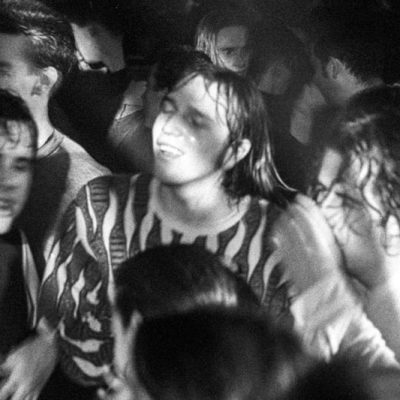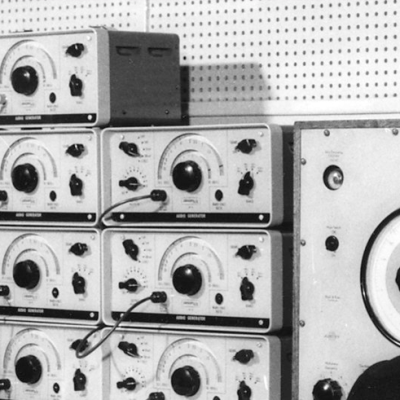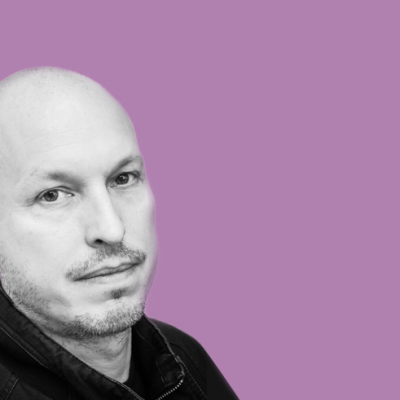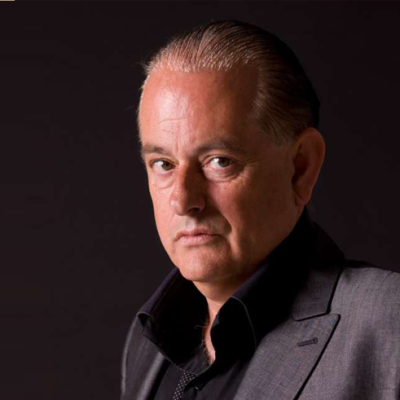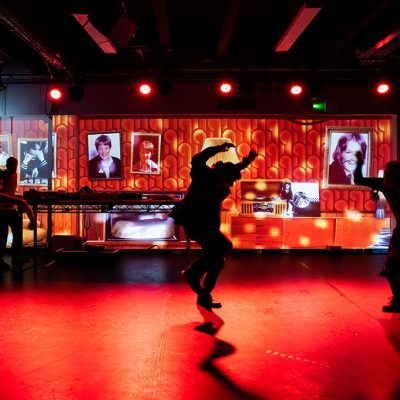Jeff Young let the music play
He has the honour of being first to bring dance music to Radio One in with his 1987 Friday-night Big Beat show. He followed this with another groundbreaking dance show, Club Culture, on Capital, along with stints at Kiss and a long-lasting show on Jazz FM. He’s also enjoyed a long and influential career behind the scenes in labels and production companies. But Jeff cut his teeth as a soul DJ, warming up for Robbie Vincent and Greg Edwards, then throwing his lot in with the new generation as electronic soul, hip hop and house started frightening off the old guard. Few DJs have such a broad understanding of how dance music moved from a world of obsessives and obscurities to the driving force of the UK music scene.
How did you get into music?
I grew up in North Kent, born 1955. All I can remember is around eight years old, I just started to listen to music. And in 1963, things were pretty exciting. I listened to the pirate stations avidly, Caroline, Radio London. I was gutted when they all closed down, because the BBC’s coverage of the music I liked was pretty poor. When I was at school it was Zeppelin, Hendrix, Stones. It was the blues-based stuff. I never liked the Deep Purples and the Genesis of this world. There was always a black music thing in me somewhere. And then when I was 17, I started DJing with a friend of mine, and it was all up to Contempo to buy imports. I still kept up an interest in pop and various other bits and pieces, but black music pretty much took over my life after I was 17.
What was Contempo like?
In those days, it was two rooms on the first floor of a building in Hanway Street, just by Tottenham Court Road. We used to get the train up there on a Saturday and climb the stairs, and the guys behind the counter would just be playing tunes one after the other. You’d stick your hand up and you’d buy it. They always had a little thing where they’d pin sevens on the wall, the stuff that had come in that week. They had a lot of back-catalogue as well. I can’t remember if the Blues & Soul [magazine] office was there as well or not. That was the first place we went to. Then after Contempo, we found places like City Sounds and The Groove, and Bluebird and all those other shops that had emerged.

When you started DJing, was it a mobile DJ set-up?
Yeah. We I DJed in a Catholic youth club, of all places. Sunday nights, and gradually got some money together, got some gear, and then started to do weddings and that kind of stuff. A good grounding really, because you learn how to get a dancefloor and then keep it, which is something I’ve seen some people still not be able to master.
When I was around 21 me and my friends, if we didn’t go to the Goldmine, we’d go to this Golden Lion pub in Sydenham where Robbie Vincent was DJing. And one week, Robbie needed a backup DJ, and so he took a flyer. I started to do bigger gigs with him. I built up a sound system, and when he got booked, he would get me to put the sound in and then back him up. And he took to me because I never stitched the main turn-up.
You laid the ground.
Yeah. I could quite happily warm a room up for an hour without playing anything. He told Chris Hill about me, and then Greg Edwards. So I ended up doing loads of warm-up gigs for these guys. Robbie then got me a gig at The Royalty in Southgate, warming up for all the big turns of the week.
What was the Goldmine like?
It was a great place to go. When we first went he was doing the swing thing with the Glenn Miller business. There’d be all these kids dressed up in army gear, waiting for the 45 minutes when he’d turn the place into a swing palace, and then he would go back to the black music. We liked it as a novelty, but we weren’t unhappy when it ended. It was a good camaraderie there which carried on for years and years. It was so rare there was a fight in the Goldmine. Everyone was friendly. The weekly lot, which was probably two-thirds of the club, you knew each other after a while. It was great.

And was it very multicultural or…?
It was multicultural, but I do think there was a little bit of door racism. A few people have said to me over the years, “I went down to Goldmine and they wouldn’t let me in,” which obviously hurt quite a lot. Embarrassing. You had the tribes in those days of course, the Brixton Frontline and so on, and everyone had black members in their tribes. So it wasn’t like we were a completely middle-class white audience. It was multicultural, but maybe not as multicultural as it could have been.
I guess the crowd in those days was largely working-class kids?
Yeah, and they nearly all traveled. There were a few kids in there from Canvey Island, but not many. Most people drove down from all kinds of places, as they did most of the other suburban soul clubs like Frenchies and Flicks, and all these other places that sprung up.

What was Frenchies like?
Frenchies was similar to the ‘Mine. Different clientele. A Sunday night, so it had a slightly different vibe. It was the first place I ever played where, a bit like the northern scene, if they really like something you played, you got a round of applause at the end of it. And that shocked me the first time it happened. I was like, “Fucking hell, what are they doing? They’re clapping.” The guy that ran it was a bit of a notorious boy, and he was quite funny. So yeah, it was great, Frenchies.
Did the music vary from club to club?
It was mainly along the same lines. The jazz funk and soul-y bits, and Philadelphia International and Salsoul. There was one period at the Goldmine where it was very jazzy. The other clubs were not as jazzy as the ‘Mine, which would have been quite tough for a lot of punters [to dance to].
And what about Flicks in Dartford? What was that like?
Well, Flicks was a different kind of club, in that although it had a black music policy, it was a dress smart thing, there’s a restaurant in the club, like a lot of those kind of clubs in those days.
Were there any DJs in particular that inspired you when you were starting out?
Chris Hill and Robbie [Vincent] and Greg [Edwards] were the obvious ones, because they would be getting stuff even earlier than some of the import shops because of their record company connections. Chris’s music was a bit tougher than what Robbie used to play, and I liked that. Later on, I began to like people like Gilles [Peterson] and Paul Oakenfold. I looked at what some of the younger guys were playing, and I used to think they put sets together really, really well. In those days you would still play anything you wanted. So you could play jazz and you could play hip hop and you could play soul, but they would be doing it in a slightly different way. It wasn’t until the acid house thing came up that nights began to emerge where you weren’t doing too much cross-pollination.
What about your broadcasting career? You played on Radio London from very early on.
Yeah. I always thought I was too Cockney for radio. These were the days when you had to have a modicum of Queen’s English to get away with broadcasting. Robbie was going away for a weekend and he put me and Graham Canter on his show on Radio London. We did that a few times, and then eventually he said to me, “Just do it on your own.”So I would do sit-ins for Robbie when he went on holiday or he’s at home cutting his grass or something. And it just developed from there.
I did go on the pirates as well. I was on JFM for a little while, but not regularly. I was working in club promotion for a major record company, and the hours were long and I was away a lot. So the last thing I wanted to do most Sunday mornings was jump out of bed and drive to Streatham to broadcast. Eventually Robbie went to Radio One, and they gave me the Radio London show. It went on at 11:30 and think it was the breakfast show for most people who we were broadcasting to.They later changed it to 8.30 which wasn’t as much fun. But soon after that I moved to Radio One.
On Radio London, were you given carte blanche to just play what you wanted?
Yeah, exactly. Whoever did that show chose the music. I’ve been really, really lucky, because every radio show I’ve done that’s my own, I’ve either programmed all of it or most of it. I did have a show on Jazz FM on a Saturday and a Sunday for a little while where they wanted me to play fifty percent playlist, but I got to choose the other half, so that was okay. And even on Capital, Richard Park let me let me choose all the music, which was pretty unheard of.
I was at Capital around 2000. Saturday nights from seven to eleven. I’d left Radio One and stayed out of radio for a while. Then I formed a production company with Pete Tong and Eddie Gordon and we got Danny Rampling onto Radio One, and [Judge] Jules. The Essential Mix was our program. I did some stuff for Kiss. And then Parky came in and I went to Capital. My Capital show had more people listening to it than the relevant Radio One shows and Kiss shows added together, it was a really good platform, it was their first foray into a proper dance show really.
I did a year on Xfm, which was disastrous. So I came off radio, and I was basically listening to Ibiza chill-out music for about ten years. And all of a sudden, I got a call from Jazz FM. Robbie wasn’t well. They said, “Would you do three and a half months?” And I stayed for ten years. So, I’ve done most of the major stations in London at various times.
What about the label side of things?
I was at Phonogram, which later became Mercury. I’d signed Shannon’s “Let the Music Play” to the label and I went to America with our video bloke to shoot a video for it. First time in New York, I couldn’t believe it. I’m listening to these radio stations, and I’m looking at the city, all this stuff. I realised that quite a lot of pop stations, like WBLS, would have a normal week. Then at, say 6pm on a Friday, they would become a dance station, and they’d stay like that until Sunday night, then they’d revert to their normal format.
So in 1987 I wrote a three-page letter to [Radio One Controller] Johnny Beerling telling him why he needed a dance program on Radio One, either a Friday or a Saturday. Indie music was in a bit of a doldrums at that point. I thought nothing would come of it. But all of a sudden there was a rumble around Radio One that they were thinking about doing this. And I’d actually agreed to go to Capital when Radio One suddenly rang and said, “Would you do Friday nights for us?” I nearly didn’t take it because they were on medium wave at that time. A medium wave at night was just an unmitigated nightmare. But they said, “Oh, six weeks after you join, we’re going FM.”
And did they let you get on with it?
I think outside of people like [John] Peel, they’d never had anyone like me in there before. They gave me a guy to work with who was a regular Radio One producer. He’s looking at me to play the dance music that’s in the chart. And I was saying, “You know what? It doesn’t really work that way.” But I was lucky, because he went off with Mike Read to do a mammoth Paul McCartney documentary which took him out of the building for months. So I just worked on my own. I got people to make jingles for me. I started in October ’87, but it took me about six months to kind of get in the groove of the whole thing. And then they started to say to me, “Man, your figures are flying.” They never showed them to me, but they were obviously very, very happy with it. And I just kept going.
At that point, even on radio shows, you were still dodging around between genres. I kind of isolated the hip hop stuff and devoted the last hour of the show to that, because it would really break up the flow otherwise. I had three or four hours so I had plenty of time to fit in the other stuff.
What other music were you playing in ’87? Early house records would have been out by then.
Yeah, early house. In those days you got letters from people saying, “Oh, you don’t play enough acid.” So I would play a bit of acid and a bit of this and that, but I didn’t go the whole hog. It was a bit of a leap of faith for me to play Lil’ Louis “French Kiss,” for example. I was always aware I was on the radio. It wasn’t in a club. There was still Salsoul and stuff buzzing about. And a lot of the British stuff that really went pop, like S’Express.
Stock Aitken and Waterman?
No, I stayed off that. Even though I was working for Phonogram. We had Kool & The Gang too, but I never played a Kool & The Gang record. I wasn’t going to do that. I might have played Cameo. I can’t remember. I probably did, but yeah, the real pop end of it, I didn’t. I might’ve played “Roadblock”, but that was a scam anyway, as we all know. It was quite funny going into a shop and someone trying to claim it was an old record from back in the day, when it was being driven by a drum machine.
Yeah. Listening to it now, you’re like, How did people fall for this?
It was shrink-wrapped as well. I ripped the record out of the sleeve and looked at the run-out groove, because there was the British mastering boys’ signature in the run-out groove. So you knew it was cut in London, and they had a drum machine on it, and no, it wasn’t Maceo. You know? So, yeah. Funny. Good scam.
Tell me about [Record Mirror dance columnist] James Hamilton
He was a larger-than-life character on a number of levels, both his height, and he was really funny. He told it like it was. If he didn’t like something you’d done, he’d tell you, no problem at all. He would come to our gigs, he’d review them, and we’d go out to eat. And of course, the size of the bloke, he was unbelievable in restaurants: two starters, two main courses. And his obsessive BPM business was a legend of its own. But yeah, he was a really, really great guy. Proper music lover. And he didn’t mind a laugh as well. We put a couple of things in Record Mirror that were proper stunts. Fictitious clubs on a Tuesday night, people wandering around Essex looking for Candles Club at Camberwick Green.
And the Japanese jazz stunt. He printed a chart with a fictitious title, and the artist was “Can you suck a large one?” It was K-A-N-U, Sukka Larjwon, spelt like a Japanese name. And of course people fell for it again, and it started to appear in people’s charts. It was tragic when he died, it really was.He died a young man, really, in the big scheme of things.
I met him once and he really reminded me of [’50s actor] James Robertson Justice.
Yeah, oh, absolutely. The whole accent thing and all that. Yeah, he was a proper lord.
In the ’80s, if you were into dance music, it was hard to actually hear it, unless you went out to clubs. Outside London, on the radio you’d get maybe two hours tops of dance music programming a week.
Radio London had a couple of shows on during the week, the big one was obviously Robbie’s Saturday show, then Greg Edwards on Capital Saturday night. You’d wait for the weekend and try and zoom in on the pirates, God bless them. They all had money problems and they kept having their transmitters nicked by the DTI and they couldn’t afford to replace them. So you never knew if your favorite guy was going to be on Sunday or not. So it wasn’t until really Radio One opened up. And then of course we had Kiss, which opened up things in London.
Kiss really did change things, didn’t it?
Yeah, absolutely. Kiss did open it up. They had a couple of false starts, but they finally got on. They had to do what all radio stations do: they started off with great intentions of having all these specialist shows, then they had to start whittling those down because they needed to get numbers to get ads. So it did get a bit diluted after about 12 months, but yeah, Kiss did a fantastic job. It’s unrecognisable to what it is now, of course, but yeah, it was great. It was exciting being involved. It really was. The place was buzzing because it was all young kids that were running it.
How has the fact that we have a national broadcaster in the BBC, influenced how music is programmed? What are the differences if you compare it with the US, which obviously has always been very commercial.
Radio One will roll with what’s happening at any one time. When Pete took the Radio One show on and club culture did absolutely explode, it had a really big influence on what they were playing during the day as well. At the end of the ’90s, that decreased a bit as the guitar genres woke up again. I think Capital might have jumped into a bit more dance stuff than it did initially. So yeah, I think it did. I think it had a huge influence.What used to happen back in the mid-’80s, something would be the leading genre of the time, whether it’s indie guitars or dance or whatever, stick around for three years, and then it’s something else. But dance turned up and it never left the building. The ’90s were just awesome when I think about it. It’s a testament to the producers and the artists that kept it moving.
It was the first kind of dance music we were able to make here that had credibility outside of the country. Suddenly, we were making music that was comparable with America.
All of a sudden you could put a studio in a bedroom, that was it. We’re off to the races. All of a sudden, we don’t have to go and record it somewhere that’s a few hundred quid a day. You can do it at home and do it very economically. The world was everybody’s lobster when technology made that leap.
When I interviewed Marshall Jefferson, he described house music as the black punk rock, and that really struck a chord with me because as a teenager, I moved down to London as punk rock was happening. And house music felt like that to me. I loved the slightly amateurish feel of it.
I think it’s a really good description. People like him took the bull by the horns and just cracked it. Absolutely.
How did you go from your Radio One show to Pete taking over?
I left Radio One at the very end of December 1990. And at the time, I had a very responsible job at A&M, and it was pretty pressured. I look back and probably all I needed was a month off, because I was just shattered. I listened to all the records. I did everything. Whereas I think where Pete was quite clever, he had a couple of people around him that helped him out. When I left they asked me what they should do, I said, “Get Pete Tong off Capital.” And they did.
How did [production company] Wise Buddha come about?
[Radio One Controller] Matthew Bannister kept badgering Pete to do more programs, and Pete just couldn’t do it, but he decided we could form a company and deliver dance-orientated programs to Radio One. It was one of the early independent production companies: Me, Eddie Gordon and Pete. The first thing we did was get Danny Rampling off Kiss. We introduced Westwood to the Radio One people. We just sort of let them shake hands, then we stepped away. We already had the Essential Mix on air, that was another one of our programs. We kept saying, “Take Gilles,” and they did eventually, about three years later. They took a drum and bass show about eight months after drum and bass first reared its head. And that was quick for them. They asked us to do it, but we weren’t sure. So they took Fabio and Grooverider in-house and just did a show with them.
And who were you dealing with at Radio One in that period?
Andy Parfitt, mostly. We said to them, “Look, we think you should get involved in Ibiza.” And they were like, “Hmm, okay, that’s interesting.” So we did a recce, decided we could do it, although we had to drive broadcast satellites to Ibiza. We didn’t trust Spanish ISDN. The first year, it was just Pete, Danny and a couple of guests did programs. The second year, we bolted on Dave Pearce. And then the third year, Radio One went mental and sent everybody. That was when Moyles went. Zoe went. Everybody went.
Is that the year that Lisa I’Anson…
Yeah, that was the, “Has anyone seen Lisa?” year.
They were asking for trouble, weren’t they?
It cost them a lot of money. They wanted to take everyone, which meant all the staff went as well. I would have just had two teams working on various times during the day, and that would have cut the costs down. But no, they wanted everyone, and it was like that for quite a few years.
Was it inevitable that house music would take over the world?
I remember being at one of the New Music Seminars in New York. And all the top boys were on the top table jabbering away with stories and insight, the likes of Marshall Jefferson and all these early adopters. And I remember saying to Pete, “If these boys put songs on these tracks they make, they’d be really dangerous.” And eventually, that did happen, and it allowed that music to open up to a wider audience who don’t all want instrumentals or dubs or whatever. Let’s face it. There are people that need a melody with their music. And in the early days of remixes, some pop act would make a generic record. And then somebody like me would send it to someone like Marshall Jefferson and say, “Turn that into a house record for me, so I can get it played in clubs.” That’s how it rolled.
Did you have to fight to get UK remixers involved?
In the early days of Janet Jackson on A&M, she was having all of her stuff done by Shep Pettibone. And we were ringing the Americans going, “Listen, this is fine, but it’s a bit like telling the same joke twice. Can you please let us get one of our guys to do it?” And we got either CJ Mackintosh on his own or him and Dave Dorrell to remix a track. She loved it. Then after that, they let us do it because what we did had more of a European flavour than just another Shep Pettibone remix. It’s always been the same. You do anything to push that record a bit further, and the remix was the tool that you use.
When you look back to the remix mania of the 1990s and triple packs of Dannii Minogue, it did get a bit mental, didn’t it?
It got completely out of hand, really. But in those days there were still budgets to be had and you would do anything to get your act into the chart. And if you got it there by selling 3000 12-inches in week one, then that’s the way you did it.
I want to ask you about the splits in the soul scene in the ‘80s, because you had a foot in both camps. Tell me about the adverse reactions to the electronic soul music that was starting to come out in the early ’80s, and to hip hop.
Well, it split the DJs as well as the punters, really. A lot of the DJs really didn’t like the step away from what was soul music of that time. At first, there was a bit of a kickback. What we never got into was the electro thing. We did records with drum machines, but we didn’t do electro, but we did do hip hop. And I think most people came round to that. In those days, hip hop was made using samples that we all knew, so there was kind of a perverse familiarity to it. Before you’ve even stuck a needle on, you knew there’s going to be a reference point for people, and it’s just down to them whether they want to take it in and dance to it or not, really.
The first huge one was Doug E. Fresh “The Show”. It was absolutely enormous. At these traditional soul weekenders you’d put Doug E. Fresh on and people would go absolutely ballistic. And that didn’t go down too well with some of the older members of the community. Same with radio, Pete [Tong] and I were deliberately pushing barriers all the time. We’d play hip hop records we thought were relevant or good, and then we did dance stuff. And of course, there was jazz as well. Even Prince was not acceptable for some people, but Pete and I were into that whole Paisley Park thing. We were pushing the barriers a bit on the radio, which helped with the clubs. But yeah, the split. Some people did go off and just do soul clubs instead of clubs that played across the board. But it split the DJs more than anything else, I think.
Was it mostly a generational thing?
Yeah, definitely. The older ones were not having it basically, whereas the younger ones, that’s what they were up for. That was their lifeblood, keeping everything moving forward. New music, new genres. So yeah, definitely. Definitely a generation splitter.
I remember reading in Blues & Soul, Frank Elson claiming that it wasn’t soul, it wasn’t soulful
To me, it was just music moving forward, music progressing. Did it have to be some sort of fist-clenching indie soul anymore? I don’t think so. We were moving on and looking for new things. I’m not surprised Frank Elson would write that. I’d be more surprised if he said, “Oh, I love all this new stuff that’s coming along.” I remember one kid writing to Blues & Soul because he looked through the back window of my car and I had a couple of Gang of Four cassettes on the back seat, and he thought that was disgusting.
How did it affect the soul scene? Was it like northern soul where some people were only playing classics?
There was new soul music for those guys to play. So, there were rooms where people would go and hear that stuff, but there was a group of us that just moved away from it, because we wanted to play other things that to us were a bit more exciting. The soul thing never really went away.
What other records divided people? Gave people a real line in the sand?
Particularly the early Def Jam stuff, really. “Rock the Bells”, “My Adidas”, all that classic stuff from Run-DMC, and the Beastie Boys. When I started the Radio London show at 8:30 in the morning, I opened up with “(You Gotta) Fight for Your Right (To Party!)”, just to send a little message to the people at Radio London. People had to make up their minds pretty quickly.
When I interviewed Pete Tong many years ago, he said, “When rap came along, me and Jeff Young became the embarrassment on the bill at those weekenders.”
We were the enfant terribles. For example, on a Sunday afternoon we deliberately played Doug E. Fresh, knowing the next bloke on the decks was Robbie Vincent. And Robbie would come on shaking his head, “Oh, fucking hell, they’re playing this shit.” So yeah, we did it deliberately.
Did you feel you were the vanguard of the next generation and these guys were out of touch?
It did feel like that. I was in a slightly difficult position because I straddled the generations. I wasn’t a young gun, yet I wasn’t one of the old gits. You know what I mean? I would be siding with the young guns, because that’s what I liked.
How important was the jazz-funk, soul scene in setting the stage for the rave scene that came later?
I think we did really set that whole rave thing up. Although people take the piss out of the weekenders, they were early raves, if you see what I mean. Three thousand people in a holiday camp! Because of licensing laws, it was one, two, three, four or five sessions of music over the weekend. And a lot of those early rave DJs came out of that soul scene. When you think of Nicky [Holloway] and Pete and Oakey, Johnny Walker, those boys cut their teeth playing soul records and then developed into their own thing. I think we were the precursor to it. I wouldn’t say I would want credit for anything, but I don’t think what we did got enough recognition in terms of what rolled forward out of it.

© Bill Brewster and Frank Broughton




